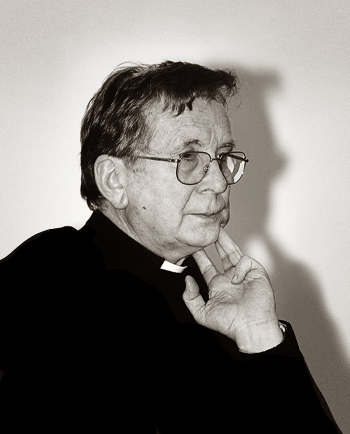
Tadeusz Józef Styczeń – a Polish philosopher and ethicist. He was born on 21 December 1931 in the Wołowice village near Krakow. He died on 14 October 2010 in Trzebnica. In 1947 he graduated from Władysław Sikorski Secondary School in Krakow and he started the novitiate at the Society of the Divine Saviour (the Salvatorians) in Bagno near Wrocław. He took his perpetual vows in 1953 in Trzebinia, and in 1955 he was ordained priest. In 1949–1955 he studied at the Faculty of Theology of the Jagiellonian University, and, after closing that faculty, at the Dominican Philosophical and Theological Institute in Krakow. In 1955 he took up philosophical studies at the Catholic University of Lublin where in 1959 he obtained the master’s degree (based on the thesis “Koncepcja cnoty u N. Hartmanna” [The Concept of Virtue According to N. Hartmann]), and in 1963 he obtained the Doctor’s degree on the basis of the dissertation “Możliwość etyki naukowej u Johna Locke’a” [The Possibility of Scientific Ethics According to John Locke]. Both theses were prepared under the supervision of Karol Wojtyła. From 1963 he was employed at the Chair of Ethics of the Catholic University of Lublin. In 1971 he obtained his postdoctoral degree based on the dissertation “Problem możliwości etyki jako empirycznie uprawomocnionej i ogólnie ważnej teorii moralności” [The Issue of the Possibility of Ethics as an Empirically Authorised and Generally Valid Theory of Morality]. In 1978 Rev. Styczeń became the head of the Chair and Institute of Ethics of the Catholic University of Lublin. Between 1982–2006 he was the director of the Institute of John Paul II, and between 1988–2006 he worked as the editor-in-chief of the “Ethos” quarterly. Also, he cooperated with other magazines, such as: “Roczniki Filozoficzne” [Philosophical Annuals], “Aletheia,” “Antropotes,” “Il Nuovo Areopago.” In 1981 he obtained the title of an associate professor and in 1992 – the title and post of a full professor. In 1975, as a guest, he gave lectures at Johannes Gutenberg University in Mainz, and in 1994 – at Ateneo Romano della Santa Croce in Rome. From 1981 he led regular series of lectures and seminars at the Institute for Studies on Marriage and Family at the Pontifical Lateran University in Rome. In 1981, together with prof. J. Seifert and prof. A. Basave, in Dallas, USA, he established the International Academy of Philosophy, which five years later was moved to Europe where it functioned as Die Internationale Akademie für Philosophie im Fürstentums Liechtenstein. Rev. Styczeń was a member of numerous Polish and foreign scientific societies, such as Societas Ethica, the Scientific Society of KUL, the Polish Philosophical Society and the Polish Theological Society, as well as the Council of Directors of the Pontifical Academy of Life. From 1981 he was a consultor to the Pontifical Council for the Family and to the Pontifical Council for the Pastoral Care of Health Care Workers. In 1994 the University of Navarra in Pamplona, and in 2007 the Institute for Studies on Marriage and Family at the Pontifical Lateran University in Rome granted him a honorary doctor’s degree.
Tadeusz Styczeń’s scientific work includes about 500 publications. His most important books are: “Problem możliwości etyki jako empirycznie uprawomocnionej i ogólnie ważnej teorii moralności” [The Issue of the Possibility of Ethics as an Empirically Authorised and Generally Valid Theory of Morality]; “Zarys etyki” [The Outline of Ethics]; “Etyka niezależna” [Independent Ethics]; “ABC etyki” [The ABC of Ethics]; “W drodze do etyki” [On the Way to Ethics]; “Wolność w prawdzie” [Freedom in Truth]; “Solidarność wyzwala” [Solidarity Makes You Free]; “Urodziłeś się, by kochać” [You Were Born to Love]; “Wprowadzenie do etyki” [Introduction to Ethics]; “Rozum i wiara wobec pytania: kim jestem” [Reason and Faith Facing the Question: Who Am I]; “Gratias ago, ergo sum.” Also, he was the editor of several books of Karol Wojtyła – John Paul II, as well as works dedicated to the Pope’s thought.
Styczeń’s research focused on metaethics, the bases and selected aspects of personalistic ethics, the relation between philosophical anthropology and theological anthropology, ethical bases of politics, as well as ethical bases of politics and the philosophical and theological thought of Karol Wojtyła. In metaethics he defends cognitivism which is based on experiencing the moral duty of respecting a person for what it is. In his opinion, ethics is a theory of the moral duty of action which is independent in its starting point. Contrary to eudaimonism and deontonomism, T. Styczeń believes that duty results from one’s personal dignity, which is also experienced in oneself. He emphasizes the importance of truth about being and its value, which should be respected by a subject, and he postulates the legal protection of life of all society members, especially the weak ones, as a fundamental good on the basis of which the man may fulfil other goods and values.
